- Home
- Tracy Chevalier
At the Edge of the Orchard Page 4
At the Edge of the Orchard Read online
Page 4
You know I got a dozen good saplings in my canoe you could have instead of seedlings, he said.
I dont want saplings, James said. Just fifteen seedlings.
My saplings are strong, they wont die on you. Theyll be producing fruit in three years—maybe even two years.
We dont have the money for saplings.
I will take credit. Youre trustworthy and not moving anywhere. Pay it back when you can.
With interest, you mean, James said. My husband aint as dumb as all that.
I see you have been doing Gods work for him again, John Chapman said, noddin at the grafted trees.
So?
Those trees will never be as strong as those grown from seed.
What, the ones you want to sell me?
Trees are stronger left to grow themselves. Man does not need to tinker with them.
So no pruning either? No thinning out trees so others grow stronger? No mulching with straw to protect em from the cold? No spreading ashes to help em grow?
God will take care of all that.
I am taking care—of the trees, of my family.
I do not think you are taking care of your wife.
I liked how John Chapman brought the conversation back to me. I liked that they were fightin about me. May have sounded like it was about trees, but it was me. I aint had men fight over me much. Maybe a little when I was just ripe. But not after ten children and nine years in a swamp.
You want to talk about trees or my wife? James said. Its one or the other.
There was a silence, then John Chapman said, Fifteen seedlings will cost you ninety cents.
James whistled. Thats a cent more per seedling than last year.
That is my price.
Thats the price I gotta pay to stop you takin an interest in Sadie?
Its you who chooses to see it that way. I am simply selling apple trees.
Bring em down, then. Ill send Robert to help you.
They went off and I was left sittin in the dead brambles, wonderin why of the three of us, I probably felt the worst.
James kept a close eye on his wife while the new grafts were vulnerable to her attention. He made a point of working near the orchard, beginning to plow the small field behind it where they would grow oats. But Sadie made no move to look at the grafts; she remained digging in the garden with Sal and Martha.
One morning when James woke he saw a muddy foot poking out from under the quilts. He glanced over at Sadie asleep beside him, then jumped up and went straight outside without even putting his boots or coat on, and ran to the orchard. One of the cows was loose among the trees, and in its wanderings it had rubbed up against seven of the fifteen graft balls, knocking them off and snapping the fragile splices. All that was left were the stumps of the root stock. The Golden Pippin scions had been trampled and chewed.
After he had shut the cow in the barn, James went back to the cabin and stood over the bed. Sadie was still asleep, her face happier and more peaceful than it should be. Or maybe he just saw what he wanted to see. He did not wake her and beat her. He did not say anything to anyone, not even to his helper Robert. Instead he mixed up more grafting clay, got out the scions he had hidden in the woods, and regrafted the trees. There was still time for them to grow, and perhaps Sadie would not notice if he did not make a fuss about it.
That night he plowed her as hard as he dared. She seemed to like it.
I was sore in the morning, snatch and head, and had to sit back down on the bed cause I felt dizzy all of a sudden. The jack can make my mornings a misery—though if I have a nip of it first thing that helps. Fight fire with fire as my Pa used to say. I wanted to ask someone to bring me a drop but for once the house was quiet. Only Martha was in, so light on her feet you couldnt hear her cept she was hummin to herself while she moved round the table and fire. She was like a little mouse waitin for me to drop a crumb for her. If I asked her for jack shed get it but hold it out so timid with her mouse paws that Id feel worse than I already did. Martha was the runt of the litter, the only weak one left who hadnt died. She hummed all the time, hymns to block out the sound of Deaths footsteps behind her. Rock of Ages, Sometimes a Light Surprises, Blest Be the Tie That Binds and that goddamn Amazin Grace. Save a wretch like me indeed. Dunno where she knew em from—I didnt teach her. Probably it was our neighbor Hattie Day, a woman who knows her hymns and how to lord em over us.
What you makin, honey? I said to her, thinkin if I used some kind words then I could ask for the jack more easily.
Pie, she said.
I could see callin her honey made her brighten like a lantern shone on her. So I used it again. What kind of pie, honey?
That second honey was a mistake—it come out false and Martha knew she wasnt my honey.
Apple pie. Im goin to get some now, she said, then wiped her hands so there was flour up and down her apron, and ran away, leavin me all alone.
Quick before she come back I went to the bottle and took a swig. That would have to do. Dont know why I didnt want Martha seein me drink, but I didnt.
It wasnt often that no one was in the house but me. It made me nervous, I liked people around even if I didnt always want to talk to em. Back east there were too many Goodenoughs nearby and I had to hide in the hay sometimes for a little peace. Not here. The hay wasnt sweet and dry like Connecticut hay. Swamp liked to get in and rot it.
I looked around the empty room. Sal and Martha kept it neat, Ill say that for em. Wood stacked, floor swept, fire burnin clear, dishes stacked on the shelves. Up in the attic theyd have made the beds all smooth. Quilts not aired cause of the rain, but they could go a few days without airin. End of the day thered be mud tracked everywhere, a pile of muddy boots by the door, food on the floor where Caleb and Nathan dropped it. But for now it was all prepared and ready for a day of battlin the Black Swamp. We werent livin with the land, but alive despite it. Cause it wanted to kill us every chance it got, either the skeeters or the fever or the mud or the damp or the heat or the cold. At least the house was warm enough, easy to do now the winters back was broken. Sometimes durin the cold spells when the snow was high against the house, all seven of us would be huddlin by the fire wrapped in quilts and not movin the whole day cept to feed the animals and the fire and ourselves. I was glad those days were done, cause my family drove me crazy then.
Martha had already made the pastry for the pie and rolled it out on the table into a perfect circle. Jest like her. Sal or me wouldnt of bothered but left it ragged, but Martha would crimp the edges all even with her little fingers and weave a pie top that looked like checkered cloth.
I was still lookin at the pastry when she come back with her apron full of apples—spitters wed kept back from the cider press for cookin. I frowned. You gonna put some sugar in with them?
Martha peeped at me with her startled eyes. No, Ma. None left.
I already knew that when I asked her. I knew what we had and didnt have. We had thirty-eight apple trees and no sugar. So what you doin with spitters? I said. Pie will be too sour to eat.
Martha didnt say anything, jest tucked her hair behind her ears like she always does.
Go back and get some of them Golden Pippins.
Martha peeped again. There arent many left, Ma.
You heard me. Go on and get em. Take those back. I nodded at the spitters shed tumbled onto the table.
Martha looked over her shoulder towards the orchard, but of course James couldnt hear. Pa wont like it, she said in a small mousy voice to go with her mousy eyes and paws.
Dont matter. You do what I say. Bring em all back here. All of em.
So she did. She took away the spitters and brought back the rest of the Golden Pippins. Funny lookin apples. Theyre little but long too, like someones pulled on em. Then she chopped em all up for the pies. Didnt say a word, but wept little mouse tears.
I couldnt wait for dinner so I could see James face when he bit into that pie. First though we had to get through the pork chops and pick
led cabbage and corn pone and apple sauce—made back when we still had some sugar. James looked mighty pleased when Martha brought out the pies—gave her a big smile cause he likes pie. She served everybody a slice but herself, though nobody noticed but me. They didnt know about the apples. Course none of them cared about apple taste like James. Caleb and Nathan jest gobbled theirs down. Sal picked at her piece cause she was wet and cold from hoein in the rain and wanted to complain about that rather than enjoy some fresh baked pie by the best pie maker in the family. Even Robert ate his slice without a word, cept for a smile at his sister.
I ate mine with my eyes on my husband. James looked so contented with that first sweet taste. Only slowly did it come to him that these were his special apples, the ones he said tasted like honey and nuts but jest tasted like water to me. He squinched his face and said, What apples are in this pie?
Martha kept her eyes on her empty plate. Golden Pippins, she said so soft only I could hear. But James didnt need to ask—he knew his apples.
Whyd you use those? You know youre not supposed to cook with those. Thats what spitters are for.
He was waitin for her to say somethin but she didnt.
Are there any left?
Marthas tongue was frozen, and it seemed like the rest of her was too. Finally she managed to shake her head. I was shovelin my pie in faster and faster, expectin her to look at me any second and then James would know I was behind it and who knows what hed do then. Not knowin made me nervous and happy. But Martha didnt say another word, didnt tell him she had been obeyin me, even though it was gonna hurt her.
It did hurt her, cause he whipped her. Id been all set to laugh and tease him about wastin his apples in the pies, but whippin Martha kind of took the fun out of it. I finished my slice, but I wasnt really tastin what I was eatin. To be honest, pies are better made with spitters anyway, even without the sugar. The tartness holds up better than the sweet when its baked.
He was whipping his daughter but he was thinking of his wife. With each red strap mark that appeared across Martha’s narrow buttocks and twig-like calves, James grew angrier at himself for punishing her when he should be aiming his blows at Sadie. He knew she was behind Martha’s using Golden Pippins for the pies. But Martha would never admit it. In all her short life she had never tattled on anyone, preferring to take the blame. Her brothers and sisters always took advantage of her silence—all except Robert. He and Martha were both quiet, though it was not the same kind of quiet. Robert was stronger, and would stand up to someone he felt was wrong. He looked straight at people with his bright brown eyes, and his level gaze unsettled them so that they didn’t dare blame him for something he did not do. Martha had watery gray eyes and never held a gaze; she tended to hunch over and keep her eyes on the ground, reminding James of a willow tree with its spindly dangling branches. This morning Sal had braided Martha’s hair in a fishtail plait that did not suit her thin locks. The braid hung down her back like a frayed piece of twine with a kink in its tail, and every time James looked at it as she leaned against the wall, awaiting the strap, its wispiness made him strike her harder than he had intended. She didn’t even cry properly, but was silent while tears dripped down her cheeks. Her siblings were silent too, watching the whipping, mostly indifferent. Only when James saw Robert grimace did he cease.
Sadie was smirking into her pie. “War,” she said, and got up to go to the bottle of applejack.
Is this a war? James thought as he escaped the airless cabin. Because if it was, he would surely lose, as his wife was more experienced than he was at cruelty and ruthlessness. It was also easier to go on the offensive, as she did, than to defend, as he must his trees.
Nonetheless, he took precautions. If he was to protect them, he would do so thoroughly. Taking precious time out from plowing—turning it over to Nathan and Caleb, who as predicted did not plow straight furrows and chipped the blade—James built around each graft a shoulder-high fence made of hickory branches sharpened to points at both ends and driven into the ground. He told the family that peeing around the trees wasn’t enough and they needed the fences to keep the deer away; but they were equally effective at stopping Sadie, or at least slowing her down. To get to a graft she would have to pull out some of the sticks. Unfortunately it meant that James could not get close to the grafts either, depriving him of the pleasure of inspecting them closely for progress. He could only peer at them from several feet away, when what he wanted to do was squeeze the buds and scrape his nail along the scion’s bark to see if it was greening. He still did not feel secure enough, and so he ringed the older Golden Pippins with deer fences as well, though they were mature enough that deer were unlikely to want their tougher leaves. Even as he built them he worried that the fences might send a signal to Sadie, tempting her to mischief she had not even thought of.
Luckily spring was such a busy time of year that she was unlikely to visit the orchard. There was too much to do: plowing and planting fields of oats and corn, digging and planting the kitchen garden, repairing roofs, cleaning out the barn and the house. While James worked with Nathan and Caleb in the fields, Sal and Martha dug the garden, and Robert swung between garden and field, helping whoever needed it most.
Because she did not like digging and did not mind making her daughters do it, Sadie mostly stayed out of the garden, and spring-cleaned the house after the long winter, throwing back the doors and windows, sweeping and scrubbing and beating and dusting. This was when she could be bothered. Sadie had never been very house-proud, not even back east. She was even less interested in it in Ohio, where it was harder to keep clean. She would get an idea into her head that something needed to be done—the quilts aired, for instance. Then she would make a great show of stringing a rope between two trees and bringing out the quilts to hang up and beat. Inevitably she would carry too much at once, and drag the ends through the mud so that they had to be scrubbed—not by Sadie, who never liked to fix what she had broken. Sal, or more likely Martha, would have to boil water and wash out the mud. By then Sadie would have moved on to another task, such as scrubbing every surface with so much vinegar that the sour acrid smell drove the family outside again. She moved between extremes: attractive when she was loving, which wasn’t often these days; or, more often, unpredictable, vicious or indifferent. James had to remind himself of the lively girl in the blue dress who had wrapped her legs around him and laughed. That Sadie was long gone, left somewhere in a field in Connecticut, the dress faded to the color of the sky.
At least she did not touch his grafts. After the declaration of war and the letting loose of the cow, she let it drop—typical of Sadie. James did not trust her, though. She might be addled with applejack most of the time, but she did not forget grudges. Indeed, she seemed to relish holding tight to them.
One April day after they had finished plowing and planting the fields, James was walking through the woods along one of the old Indian trails they didn’t use much, looking for muskrat push-ups he could set snares near, when he became aware of a green haze overhead. The leaves on the trees had come out, small and new and creased like a summer quilt that has been folded away during the winter months and needs a day or two of shaking out to become smooth. Although he knew that unless God had other, apocalyptic plans, it would happen every year, James was always caught off guard by the leaves’ appearance. He thought he had been keeping a close watch, yet they still managed to surprise him so that he never caught the midpoint between closed bud and open leaf.
With his eyes on the leaves, he stepped into a mudhole that slopped over the top of his boots and stank of rot. James cursed and stopped to shake them out. This was why his children often went through the swamp barefoot—it was easier washing your feet than getting boots clean of swamp mud. But James hated the squelching clay between his toes, and preferred the civility of shoes.
When he stood up again he noticed, just off the path, a gray-brown boll plastered around the sawn-off branch of a wild apple tree, a small wa
nd sticking up out of it. It was the tree he’d once eaten sour fruit from when he was desperate for the taste of apples.
He stepped up to the graft, but didn’t even need to examine it to know it was Robert’s work, for it looked exactly like a graft James himself would have made. There was no one within a hundred miles who could copy him so well. Not only that: the graft had taken, with buds on the scions close to bursting into leaves. He couldn’t be sure until it flowered, but he suspected the blossoms would be tinged the pink of Golden Pippins. Robert was thinking ahead, cultivating an apple tree out of Sadie’s way. James smiled at his son’s foresight.
Though he should have gone on to look for signs of muskrats—the drag of their tails, the underwater entrance in the stream he was following—James instead did something a settler would never normally do during the busy springtime when food stores are still low and there is so much work to be done. He did nothing. Lowering himself onto a damp log, he sat and looked at the green fuzz taking over the trees, at the birds flitting through the branches as they built nests, at the trout lilies and trilliums and Dutchman’s breeches at his feet and at the graft his son had created at a safe remove from Sadie and her wrath.
Gradually he relaxed on the log in a way he never could around people. He liked to note the cycle of the trees through the seasons, with their leaves unfurling to an intense green, then flaring and browning and falling. Trees did not talk back, or willfully disobey, or laugh at him. They were not here to torment him; indeed, they were not here for him at all. James’ sitting under them did not matter one way or another, and for that he was profoundly grateful.
He contemplated the grafted Golden Pippin before him, and wondered how long it would manage to grow before the Black Swamp got to it with mildew or mold or rot. Humid swampland, full of grasses and reeds and trees run wild, was not ideal for an apple tree—though the wild one had managed somehow.
James sighed and looked down at his hands, roughened and scarred from years of the worst kind of hard work—the futile kind. After nine years he knew he should have gotten used to the life here. The Goodenoughs were old-timers compared to all the newcomers whose axes rang through the woods as they fought the trees. They were now the people new settlers came to for advice on how to drain a field to grow barley (Grow potatoes), on how to keep the skeeters at bay (Wear mittens in August), on whether the numerous bullfrogs were tasty enough to eat in a pinch (You’ll find out).

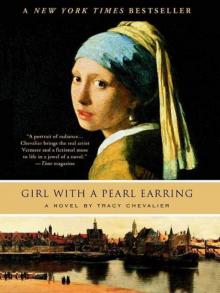 Girl With a Pearl Earring
Girl With a Pearl Earring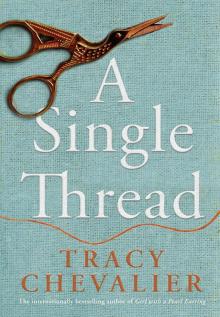 A Single Thread
A Single Thread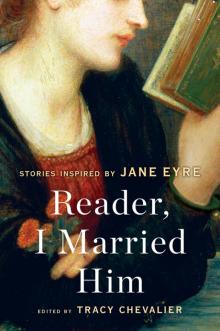 Reader, I Married Him: Stories Inspired by Jane Eyre
Reader, I Married Him: Stories Inspired by Jane Eyre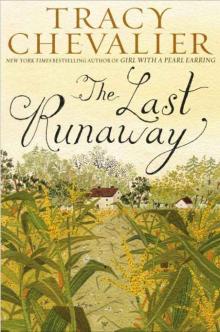 The Last Runaway
The Last Runaway Burning Bright
Burning Bright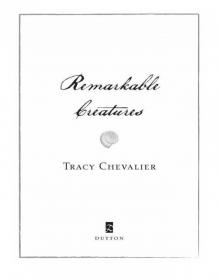 Remarkable Creatures
Remarkable Creatures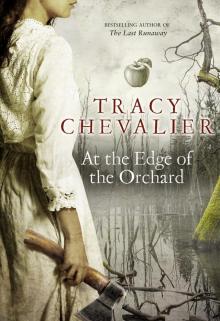 At the Edge of the Orchard
At the Edge of the Orchard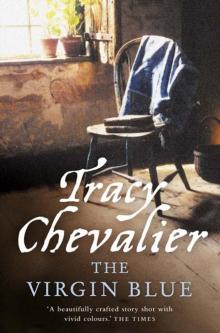 The Virgin Blue
The Virgin Blue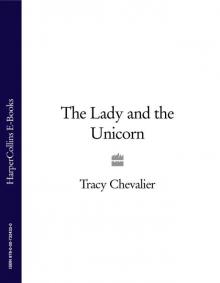 The Lady and the Unicorn
The Lady and the Unicorn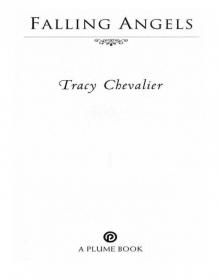 Falling Angels
Falling Angels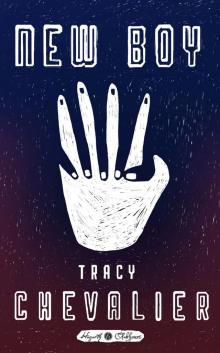 New Boy
New Boy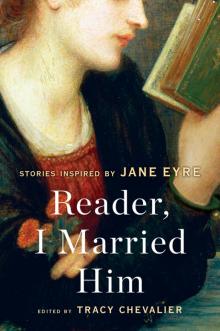 Reader, I Married Him
Reader, I Married Him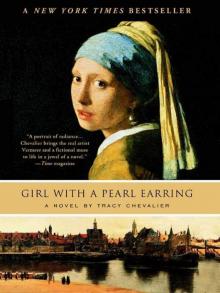 Girl with a Pearl Earring, The
Girl with a Pearl Earring, The